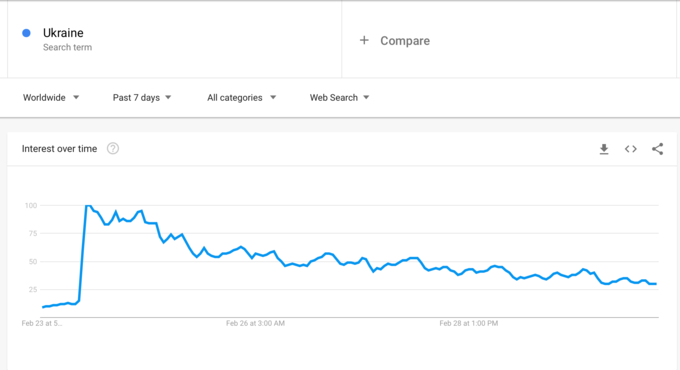The Internet's Interest In Ukraine-Russia War Appears To Be Declining, But The Memes Were Mighty

It has been one week since Russia invaded Ukraine, and the internet’s fevered response to the war now shows signs of simmering down. According to Google Trends, search volume for the terms “Ukraine”( and related terms like “Russia” and “Putin”) peaked on February 24th, and then steadily declined. As of the writing of this article, worldwide search interest on Google is still above its level prior to the invasion, but continues to trend downward.

However, search interest in most European countries has remained high, peaking each morning in a steady cycle as people check the news upon waking. Search interest in the United States, however, has followed global trends and declined overall.


Looking at the memes and big viral stories of the Ukraine war, a similar pattern of rising and falling emerges. Interest in Snake Island, for example, peaked on February 25th, the day the original story came out, and then declined since.

A group of Ukrainian border guards were stationed on Snake Island, in the Black Sea south of Odessa, when a Russian warship ordered them to surrender under threat of attack.
Their response: "Russian warship, go fuck yourself."
They held their ground. All 13 were killed. pic.twitter.com/GMRsXQRSX0— Alejandro Alvarez (@aletweetsnews) February 25, 2022
On February 26th, search interest in the Ghost of Kyiv peaked, and then declined (although remained somewhat more stable). The Ukrainian government even posted about the legend on its official Twitter account with fan art of the rumored Ghost.

People call him the Ghost of Kyiv. And rightly so -- this UAF ace dominates the skies over our capital and country, and has already become a nightmare for invading Russian aircrafts. pic.twitter.com/lngfaMN01I
— Ukraine / Україна (@Ukraine) February 27, 2022
Putin: "Russia is doing military exercise in Ukraine"
The Ghost of Kyiv: pic.twitter.com/YCTnStCtik— Gamer1🎮🕹 (@LFCFanClub3) February 25, 2022
On Sunday, search interest in the phrase “sunflower seeds in your pockets,” in reference to a viral video of an old Ukrainian woman telling off a Russian soldier and telling him to place the seeds in his pocket so flowers grow when they die, peaked and then declined as well.

Ukrainian Woman Marches Up To Armed-Russian Soldier And Offers Him Sunflower Seeds To Put In His Pocket So They'll Bloom When He Dies On Their Soil https://t.co/3CB9dt5WmL pic.twitter.com/O3h2UgAtTm
— Barstool Sports (@barstoolsports) February 24, 2022
The three memes followed each other, each telling a similar story of Ukrainian defiance against Russian invaders. While some of the specific details of each meme have since been thrown into question, they became emblematic for foreign observers of the situation on the ground. It was (and remains) impossible to get a full picture of the war in Ukraine, as the situation is complex, changing rapidly and involves millions of people. But these three moments worked their way to the top of the public’s mind and became foundational to the narrative of the conflict early on.
Europeans who woke up in the morning and saw these memes later attended street protests that pushed their governments into issuing unprecedented sanctions against Russia and reorienting the European Union's entire attitude to collective defense. It's conjecture to attribute the latest round of sanctions to memes, but the role they played in shaping public opinion is indisputable.
The question that will likely face online activists and politically attuned memers in the days to come is a similar one to the question asked following the summer of 2020's protest movement in the wake of George Floyd’s murder — what happens after search interest cools down and Twitter feeds begin to feature normal things again, like celebrity gossip and domestic politics? How is a sense of urgency maintained in the face of the internet’s rapidly shifting attention? What will be the next viral Ukraine war meme? Only time will tell.





Comments ( 0 )
Sorry, but you must activate your account to post a comment.